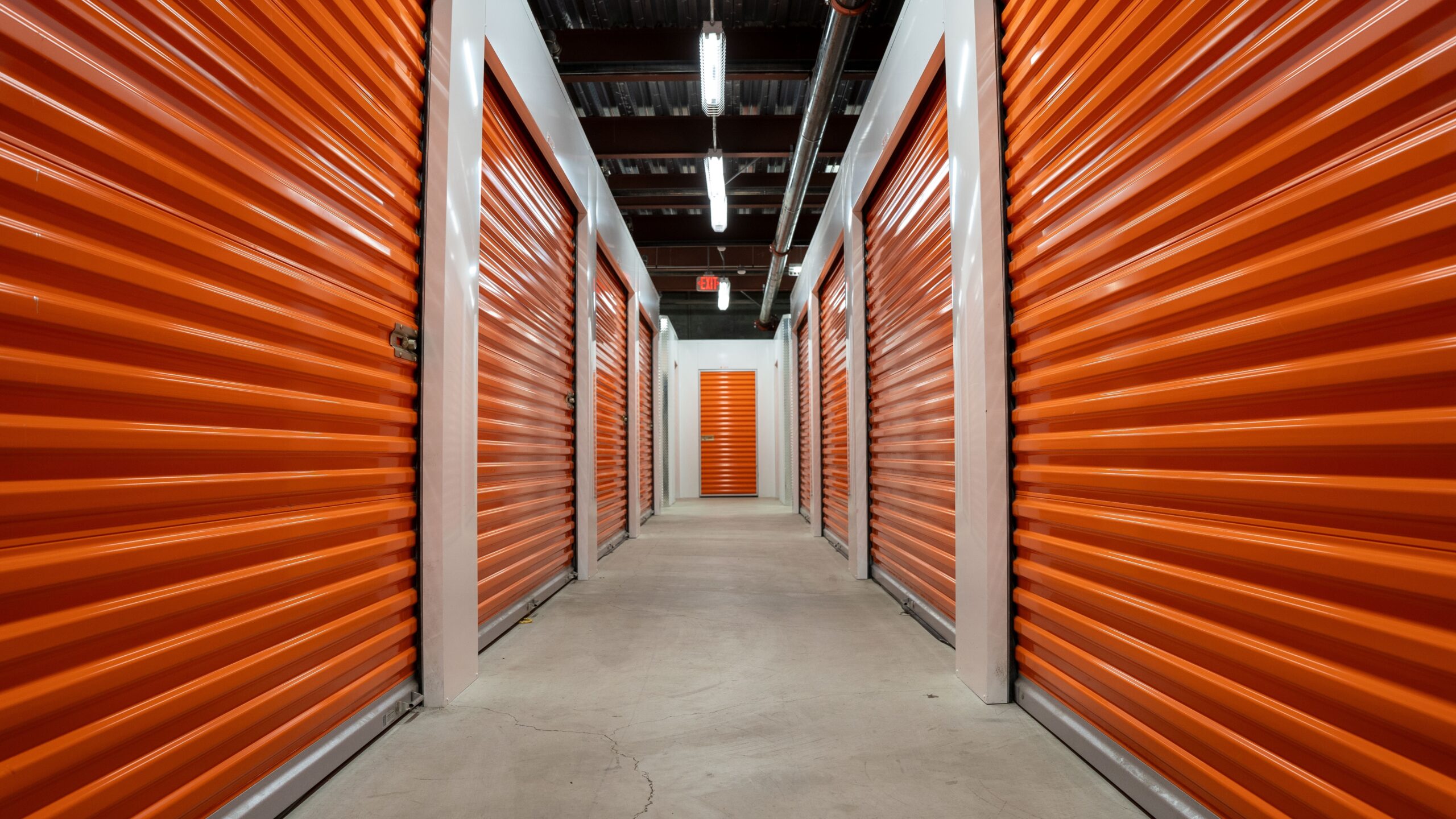As your small business grows, so do your business storage needs. Expanding operations often comes with challenges like managing inventory overflow, finding space for equipment, or organizing important documents and records.
There are a variety of business storage solutions available, each catering to different needs and budgets. The right solution for you depends not only on the size of your business now but also on how you expect it to scale in the future. Planning ahead and choosing a storage option that can grow with your business will save you time, money, and headaches down the line.
Whether you choose an expansive warehouse space or opt for a more affordable self storage unit, your solution should provide the right amount of space to efficiently manage your inventory, equipment, archived records, and any other items you need to house. Beyond just space, think about accessibility, security features, and flexibility—these factors can make a big difference in how smoothly your operations run.
Cost-conscious decisions are critical to small businesses that are balancing growth with tight budgets. Choosing the right business storage solution isn’t just about saving money; it’s about creating a solid foundation for your business to thrive.
Growing Businesses Need Flexible Business Storage Solutions
According to the latest data from U.S. Small Business Administration (SBA), small businesses in 2024 comprised 99% of all U.S. firms. For many of these businesses, affordable business storage solutions are essential to support their expanding operations. . Changing business models, such as online retail, hybrid work arrangements and technological advances are also creating demand for flexible storage options.
Small businesses often run on tight budgets are already managing rising real estate costs, overhead costs and the expense of lengthy leases. If your small but growing business requires inventory, equipment, documents and records or even furniture, a good business storage solution is paramount to help store and manage it all.
As you sort through how to use self storage for business, remember to evaluate your specific needs, such as the amount of space required, your budget, and the flexibility you need for future growth. Whether you choose self storage or a traditional warehouse, the right solution will help streamline your operations, reduce overhead, and support your business’s continued success.
Room to Grow: Warehouse Storage Provides Small Businesses the Space to Scale
Warehouse storage is best suited to small businesses that deal in high volumes of goods and inventory, such as e-commerce retailers, manufacturers, third-party logistics providers, importers/exporters, food and beverage distributors and businesses that handle large volumes of seasonal inventory.
Warehouse Storage: What’s Available?
Warehouses come in all shapes and sizes, from massive distribution centers with specialized features like loading docks, climate control and high ceilings to smaller, basic industrial storage spaces:
| Warehouse Type | Facility Details | Best Suited For |
|---|---|---|
| Public Warehouses | Shared facilities managed by third-party providers that offer flexible space and services, like inventory management and transportation. | Small budget-conscious businesses that need affordable options without long-term commitments. |
| Private Warehouses | Owned or leased by a single business and provide the lessee full control over operations in exchange for a significant investment. | Small businesses with a high-volume of inventory. |
| Distribution Centers | Designed for receiving, storing, and shipping goods. | Logistics-heavy operations or e-commerce businesses. |
| Smart Warehouses | Automated facilities with high upfront costs that use AI and robotics for streamlined operations. | Large-scale businesses that prioritize speed and accuracy. |
Typical Cost Structure
Warehouse costs vary based on location, size, amenities and lease terms.
- Base Rent: Average rates range from $8–$15 per square foot annually, depending on location.
- Operating Costs: Annual costs for utilities, insurance, security, and maintenance can add $3–$5 or more per square foot.
- Lease Length: Long-term leases, typically 5–10 years, often provide lower cost per square foot, but require higher initial deposits and greater financial commitments. For example, a 4,000-square-foot warehouse at $15 per square foot annually would cost approximately $5,160 per month.
While warehouse space provides robust storage capacity, it might not be ideal for small businesses with fluctuating inventory or tight budgets. For businesses that need stability and room for growth, warehouse storage solutions are a good choice, but the commitment length and hidden fees could pose challenges for smaller businesses or tighter budgets.
What to Know When Choosing Self Storage for Small Business Storage
Self storage offers optimal go-to business storage solutions for businesses that are just starting out or businesses with small footprints. These units are compact and affordable, and the month-to-month rental terms are ideal if you aren’t sure what you will need later, but are clear on exactly what you need right now.
Self Storage: What’s Available?
If you’re thinking about how to use self storage for business, you’ll want to know your options. The self storage solution that works for you depends on what and how much you are storing, for how long, and how much you can afford to spend on a monthly basis.
If you need something small and secure, a storage locker may be a fit. If you are storing equipment or inventory, a storage unit will be the better fit:
Storage Unit Types
| Storage Unit Type | Facility Details | Best Suited For |
|---|---|---|
| Storage Lockers | Smallest unit size, usually located and accessed inside the storage facility. | Businesses that need secure storage for valuable records, documents and archives. |
| Standard Storage Units (Various Sizes) | Closet-sized to garage-sized walk-in units that may offer additional amenities like surveillance, 24-7 access and climate control. | Businesses that need minimal, temporary or climate-sensitive storage. |
| Drive-Up Storage Units | Ground-level drive-up units with wide doors for easy loading and unloading. | Retailers that receive large or frequent shipments. |
| Mobile Storage Containers | Containers or pods delivered to your location for loading, then picked up and moved to storage location. | Businesses that need temporary, portable and secure storage on-site. |
| Vehicle Storage (Outdoor/Indoor) | Designated parking spaces or enclosed units that may offer additional security and surveillance features. | Businesses with company vehicles, fleet vehicles, or trailers that need long or short-term storage. |
Typical Cost Structure
- Base Rent: Average monthly rates range from $50–$300 depending on size and location. Storage units typically range in size from 25–300 square feet. Month-to-month contracts add value with no long-term commitment.
- Operating Costs: Additional expenses vary by location, and may include security deposits, administrative fees and insurance. Ask for a list of costs and fees, including any penalty fees and lock-cutting costs should you lose your key.
- Features and Amenities: Many storage facilities offer security features like 24-7 access, surveillance cameras and gated access. Premium services like climate control may cost extra, but could be worth the cost to protect sensitive inventory.
Warehouses might also require property taxes or equipment rentals. Self-storage fees usually include moving supplies and locks. However, when you look at the long-term, warehouse costs can really add up over the years. Self-storage monthly rentals do not require a long-term upfront commitment, which gives evolving businesses the ability to adjust and scale if and when their storage needs change.
Here is a breakdown of typical expenses associated with warehouse storage and self storage solutions you should expect to encounter:
The Price for Space: Self Storage and Warehouse Space Cost Comparison
Regardless of which of these business storage solutions you choose, you should expect to pay some upfront costs in addition to your monthly lease fees.
Deposits and first/last month’s rent are pretty standard, but where you’ll see a real difference is in your monthly expenses. Warehouse storage rates usually include rent, utilities, insurance, maintenance, and sometimes even staffing costs. Self-storage, on the other hand, is mostly rent and insurance, plus a bit extra if you opt for climate control.
| Cost Factor | Warehouse Storage | Self Storage |
|---|---|---|
| Cost Per Square Foot | $0.75 – $2.00 and up monthly | $0.50 – $2.50 and up monthly |
| Initial Costs | High deposits, first and last month’s rent, security deposit, broker fees | First month rent, security deposit, admin fees if applicable |
| Monthly Costs | Higher per square foot, includes operational expenses | Lower monthly fees based on unit size and features |
| Utilities | Paid separately, often based on use | Usually included in rental fees |
| Maintenance | Tenant responsible for repairs and upkeep. | Maintenance generally covered by the facility. |
| Insurance | May require business-specific insurance. | Some facilities offer basic insurance, but additional coverage may be necessary. |
| Security | Often requires independent security investments. | Most offer on-site security with cameras and controlled access. |
| Hidden/Unexpected Costs | Staffing, property management, loading equipment rentals, specialized security systems. | Insurance fees, late payment penalties, lock fees, optional add-ons like climate control. |
| 1-Year Projection | $10,000 – $30,000 and up | $6,000 – $30,000 and up |
| 3-Year Projection | $30,000 – $90,000 and up | $30,000 – $90,000 and up |
| 5-Year Projection | $50,000 – $150,000 and up | $30,000 – $150,000 and up |
Beyond Cost: Keep These Things in Mind When Selecting Your Business Storage Solution
Sometimes seemingly small details can become big hassles if you don’t account for them beforehand. Below are some additional things to consider when thinking about how to use self storage for business, or when choosing a warehouse space.
Self Storage Considerations:
- Reputation and Reviews: Before you commit, research the storage facility’s reputation and read online reviews to gauge customer satisfaction and identify potential issues like poor maintenance, security problems, or unhelpful staff.
- Hidden Fees and Contract Terms: Carefully review the rental agreement, paying close attention to clauses regarding late fees, cancellation policies, insurance requirements and automatic renewals.
- Business-Specific Services: Some facilities offer services tailored for businesses, such as package delivery, free Wi-Fi, electrical outlets, or even office furniture for an additional fee.
- Accessibility: Consider the ease of access to the facility, especially if you will regularly need to move large or heavy items. Ensure there are adequate loading docks, ramps, or elevators as needed.
- Insurance: Determine if the storage facility’s insurance covers your business items and if you need to purchase additional insurance to protect your inventory.
- Location: Choose a location that is convenient for your business and staff, and note any heavy traffic patterns, especially if you plan to make frequent trips to the facility.
- Environmental Considerations: Ensure the facility has appropriate containment measures and ventilation if you plan to store items that could potentially leak or release harmful substances.
Warehouse Storage Considerations:
- Location Matters: Choose a location that’s convenient for you and your employees. A central spot can save time and money on transportation but ensure it aligns with your delivery routes and client proximity.
- Legal Protections: Always have a lawyer review your lease agreement. Missteps here can lead to costly disputes or hidden fees.
- Security Measures: Install cloud-based cameras both inside and outside the property for added safety and accountability.
- Logistics Planning: Think about how shipments arrive and leave. If you need a loading ramp or wide doors, make sure these features are part of the property. Negotiate parking and loading zones upfront and get agreements in writing.
- Climate Control: If your business operates in extreme weather, check the insulation and HVAC systems to ensure a comfortable working space, and to avoid high energy costs and potentially damaged goods.
- Know Your Neighbors: Research potential neighboring businesses. Parking conflicts, dumpster disputes, or noisy operations can disrupt operations and cause delays.
Making the Right Business Storage Choice for Your Small Business
Ultimately, the right choice will depend on your budget, your goals, your history and your business forecasts. The cost differences between warehouse storage and self storage solutions are significant, so evaluate your current and future business storage needs carefully and base your decision on your business model.
Traditional warehouse space is an excellent choice for established, stable operations that regularly receive large shipments and have a demonstrated need for large-scale storage for years to come. If your small business is brand new or is just beginning to expand, self storage lets you grow and scale without locking you into a long-term contract that may, or may not, be a good fit later. Let us help you assess your needs and explore your options to find the ideal storage solution for your business.






